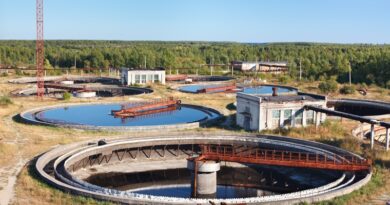Water-secure world needs global collaboration, innovation, investments

A clear roadmap for building a water-secure world and to meet 2030 requires collaboration between countries, innovative approaches and increased investments in water resources are essential to meet 2030 goals related to climate, sustainable development, and disaster risk reduction.
Water-related and other physical climate risks significantly threaten public utilities, corporations, and financial institutions. These include increased water scarcity from changing precipitation patterns, flooding from extreme weather, and damage to water infrastructure from climate disasters. Such challenges can disrupt operations, increase costs, and potentially cause major financial losses, notes a recent Green Climate Fund (GCF) statement.
Investment in weather, water, ocean, and climate sciences is necessary to address these risks. While these sciences have seen revolutionary advancements in recent decades, gaps in global surface data, lack of accessibility for local communities, and insufficient scientific capacity prevent their full and effective use.
The Green Climate Fund statement says it recognises the urgent need for a comprehensive, innovative approach to water security, as well as the importance of investing in early warning systems and risk assessment tools, critical water infrastructure, flood, and drought management, IWRM, climate resilience WASH and capacity building. However, these measures alone won’t suffice. This is why GCF utilizes innovative financial tools, mobilising private finance to help expand our water security portfolio. To date, GCF has mobilised $2.8 billion to water security, allocated across 38 projects in 58 countries.
Despite global commitments to achieve 2030 targets related to climate, sustainable development, and disaster risk reduction, the world is falling short of reaching these milestones. This is especially evident in water resources management, a top priority sector in National Adaptation Plans (NAPs) and other regional adaptation policies.
The 2023 UN Water Conference and the World Water Week in Stockholm this year made significant strides in addressing the global water crisis and promoting sustainable water management. The Water Action Agenda and commitments made during these events provide a roadmap for building a water-secure world. Collaboration between nations, innovative approaches, and investments in water resources are essential to meet 2030 goals. But, achieving these targets will require $114 billion per year in capital expenditure.
GCF notes that water security is central to its activities: of the currently mobilized $ 2.8 billion to water security across 38 projects in 58 countries, some 51 per cent of its water projects are devoted to water security. Within this 51 per cent, 17 per cent of projects are dedicated to agriculture and food security, 9 per cent to ecosystems and ecosystem services, and 7 per cent to early warning and early actions.
The remaining 18 per cent are dedicated to energy, infrastructure, health, and wellbeing initiatives.
Building on the outcomes of the UN 2023 water conference, the Green Climate Fund recognises the profound and complex challenges climate change poses for global water security, such as increased scarcity, flooding, contamination, infrastructure damage, ecosystem disruption, and potential transboundary conflicts. These challenges have associated risks to public utilities, corporations and financial institutions which can disrupt operations, increase costs and potentially cause major financial losses.
Overcoming these interconnected challenges, the GCF states, will take bold commitments with innovative solutions, clear and measurable targets, institutional and policy reforms, dedicated financing, and cross-border collaboration. Amongst others, addressing these risks involves investment in weather, water, ocean, and climate sciences, which have seen revolutionary advancements in recent decades. However, significant challenges remain, such as gaps in global surface data, lack of accessibility for local communities, and insufficient scientific capacity prevent their full and effective use.
Water risks in an era of climate change involve complex interactions which are interconnected and systematic. As a result, the GCF recognizes the need for a comprehensive, innovative approach to water security that embraces this complexity. For the GCF, an appropriate response to strengthen water security for climate resilience requires a flexible and needs-based approach to projects which uses a nexus and integrated approach.
The GCF invests in water security through different pathways which include water conservation, efficiency, and reuse, hydrological observation, forecasting and risk, assessment, integrated water management and SDG targets, climate resilient WASH and community knowledge. Within this spectrum of activity, the GCF underlines that although most current climate finance goes to mitigation projects, the mitigation potential of water remains largely neglected (e.g., wetland restoration and conservation). Therefore, this presents an opportunity to scale up efforts and align financing flows across different categories such as biodiversity, water management, and carbon credits. Additionally, GCF promotes sustainable water management practices that conserve resources and protect ecosystems. It supports projects that enhance community adaptive capacity, particularly for those most vulnerable to climate change.
At the level of financing, it also requires an innovative approach, viewing water as an asset class. The GCF leverages public and private investments to mobilise resources for water security and blending grants with innovative financial instruments such as water bonds, ‘catastrophe bonds’ (a debt instrument designed to raise money for companies in the event of a disaster), debt for climate swaps, etc.
To accelerate the achievement of the 2030 targets related to climate, sustainable development, and disaster risk reduction, the GCF lists six sets of actions that are needed.
The first is increased investment in weather, water, ocean, and climate sciences to address the challenges posed by climate change and risk informed early warning systems.
The second is harnessing private finance and exploring non-traditional financial instruments like equity investments, insurance, debt-swap and guarantees.
The third is working to align investments for water security with climate action to create new financing opportunities for private sector linking to public sector or SMEs.
Fourth is important to recognise the potential of water as a tool for mitigating climate change and scaling up efforts accordingly.
Fifthly the GCF advocates the promotion of sustainable water management practices that conserve water resources and protect ecosystems. And lastly, the GCF works to support projects that enhance the adaptive capacity of communities most vulnerable to climate change.



